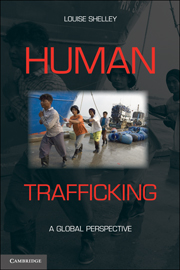Book contents
- Frontmatter
- Contents
- Acknowledgments
- Introduction
- Part I The Rise and Costs of Human Trafficking
- Part II The Financial Side of Human Trafficking
- Part III Regional Perspectives
- 5 Asian Trafficking
- 6 Human Trafficking in Eurasia and Eastern Europe
- 7 Trafficking in Europe
- 8 Trafficking in the United States
- 9 Human Trafficking in Latin America and Africa
- Conclusion
- Index
- References
7 - Trafficking in Europe
Published online by Cambridge University Press: 05 June 2012
- Frontmatter
- Contents
- Acknowledgments
- Introduction
- Part I The Rise and Costs of Human Trafficking
- Part II The Financial Side of Human Trafficking
- Part III Regional Perspectives
- 5 Asian Trafficking
- 6 Human Trafficking in Eurasia and Eastern Europe
- 7 Trafficking in Europe
- 8 Trafficking in the United States
- 9 Human Trafficking in Latin America and Africa
- Conclusion
- Index
- References
Summary
The rise of human smuggling and trafficking challenge the core of Western European identity. Few European countries had numerically significant immigration before the post – World War II period; instead they were sources of emigrants who traveled to far-distant colonies as well as to North and South America. Unlike the advanced Western democracies of the United States, Canada, and Australia, most European countries have had limited experience in integrating migrants. Instead, European history has been filled with examples of persecution of minorities. Therefore, the influx of migrants from former colonies and guest workers to Europe in the post – World War II period has posed an enormous cultural, political, and social challenge to most European countries. The significant growth in the number of smuggled and trafficked people in the last two decades has only compounded the challenge.
Often the migration debate within Europe has been framed within the context of maintenance of national identity and domestic and regional security. Therefore, the increased numbers of illegal migrants and trafficking victims compound the challenge that already exists in Western Europe of absorbing the diverse migrants and political refugees with different cultural, educational, and life experiences than Western Europeans who have grown up in prosperous democratic societies. These problems of assimilation are compounded by the fact that those who are being smuggled and trafficked often are racially different from Europeans and have different religions, as many are arriving from Africa, the Middle East, and Asia. Therefore, in many countries there is a backlash against migrants that can also include victims of trafficking. Yet the backlash is greatest against visible illegal migrants, among whom trafficking victims are rare. The focus of many European countries is on removing the trafficked individuals and repatriating them rather than on assisting and admitting those often highly traumatized individuals. When the Council of Europe (COE) Convention on Trafficking entered into force in early 2008, COE member states became obligated to offer assistance to trafficking victims, including a reflection period (during which the victim cannot be deported). Medical care and legal help are to be provided. Yet this is not always operational, as trafficking victims often do not cooperate with European law enforcement and are not identified as trafficking victims. Bureaucratic obstacles also prevent the operation of the Convention as intended.
- Type
- Chapter
- Information
- Human TraffickingA Global Perspective, pp. 201 - 228Publisher: Cambridge University PressPrint publication year: 2010



